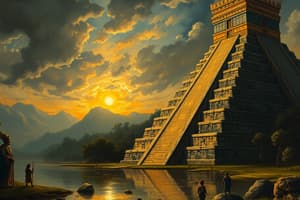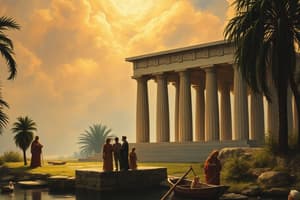Podcast
Questions and Answers
Which monarch ruled England first in the 17th Century?
Which monarch ruled England first in the 17th Century?
- King James I (correct)
- King Charles I
- King Charles II
- Queen Anne
What event marked the end of monarchical rule by the Stuarts in the 17th Century?
What event marked the end of monarchical rule by the Stuarts in the 17th Century?
- Execution of King Charles I (correct)
- Accession of Queen Anne
- Glorious Revolution
- Restoration of King Charles II
When did Queen Anne's reign end?
When did Queen Anne's reign end?
- 1660
- 1714 (correct)
- 1798
- 1649
Which monarch was restored to the throne in 1660?
Which monarch was restored to the throne in 1660?
What was the family name of the monarchs who ruled England from 1603 to 1714?
What was the family name of the monarchs who ruled England from 1603 to 1714?
What significant event took place in 1620 that was related to colonization?
What significant event took place in 1620 that was related to colonization?
Which region was notably affected by the English and Scottish settlers' plantation of land?
Which region was notably affected by the English and Scottish settlers' plantation of land?
What was a major factor that led to conflicts between the East India Company and other trading entities?
What was a major factor that led to conflicts between the East India Company and other trading entities?
Which of the following was NOT a consequence of the English colonization efforts during this period?
Which of the following was NOT a consequence of the English colonization efforts during this period?
What can be inferred about the motives behind the plantation of Irish land?
What can be inferred about the motives behind the plantation of Irish land?
What is the time frame of the Jacobean Age?
What is the time frame of the Jacobean Age?
The term 'Jacobean' is derived from which Latin name?
The term 'Jacobean' is derived from which Latin name?
Which monarch's reign defines the Jacobean period?
Which monarch's reign defines the Jacobean period?
Which countries were under the reign of King James I during the Jacobean Age?
Which countries were under the reign of King James I during the Jacobean Age?
The term 'Jacobean' is primarily associated with which period?
The term 'Jacobean' is primarily associated with which period?
What is the term used to describe the most advanced stage of human social and cultural development?
What is the term used to describe the most advanced stage of human social and cultural development?
Which of the following best describes the concept of denotations in the context of social and cultural development?
Which of the following best describes the concept of denotations in the context of social and cultural development?
In which context is the term 'most advanced' placed when discussing social and cultural organization?
In which context is the term 'most advanced' placed when discussing social and cultural organization?
Which aspect is typically NOT associated with the most advanced stage of human development?
Which aspect is typically NOT associated with the most advanced stage of human development?
What is implied when comparing social and cultural development across generations?
What is implied when comparing social and cultural development across generations?
What was a significant contribution of James during the Jacobean Age?
What was a significant contribution of James during the Jacobean Age?
What aspects were primarily produced during the Jacobean Age?
What aspects were primarily produced during the Jacobean Age?
How did James's religious beliefs influence his leadership?
How did James's religious beliefs influence his leadership?
Which of the following characteristics best describes the Jacobean Age?
Which of the following characteristics best describes the Jacobean Age?
Which statement about James’s approach to Protestantism is true?
Which statement about James’s approach to Protestantism is true?
What distinguishes Civilization studies from cultural studies?
What distinguishes Civilization studies from cultural studies?
Why is studying Civilization considered important?
Why is studying Civilization considered important?
Which method is most effective for studying Civilization?
Which method is most effective for studying Civilization?
In which aspect do Civilization studies differ from Anthropological studies?
In which aspect do Civilization studies differ from Anthropological studies?
What might be a misconception about the goals of Civilization studies?
What might be a misconception about the goals of Civilization studies?
Flashcards
East India Company conflicts
East India Company conflicts
Conflicts arose between the East India Company and other powers, notably the Dutch.
North American colonization
North American colonization
The East India Company's activities led to the settlement of the east coast of North America.
Pilgrim Fathers' voyage
Pilgrim Fathers' voyage
The Pilgrim Fathers sailed to New England in 1620.
Irish land confiscation
Irish land confiscation
Signup and view all the flashcards
Ulster settlements
Ulster settlements
Signup and view all the flashcards
Age of Alexander Pope
Age of Alexander Pope
Signup and view all the flashcards
Age of Johnson
Age of Johnson
Signup and view all the flashcards
Stuart Monarchs
Stuart Monarchs
Signup and view all the flashcards
17th Century English Rulers
17th Century English Rulers
Signup and view all the flashcards
Restoration (1660)
Restoration (1660)
Signup and view all the flashcards
Jacobean Era
Jacobean Era
Signup and view all the flashcards
Jacobean Period
Jacobean Period
Signup and view all the flashcards
King James I
King James I
Signup and view all the flashcards
Jacobean adjective
Jacobean adjective
Signup and view all the flashcards
Years of the Jacobean Era
Years of the Jacobean Era
Signup and view all the flashcards
Civilization Studies vs. Cultural Studies
Civilization Studies vs. Cultural Studies
Signup and view all the flashcards
Civilization Studies vs. Anthropology
Civilization Studies vs. Anthropology
Signup and view all the flashcards
Why Study Civilizations?
Why Study Civilizations?
Signup and view all the flashcards
Approaches to Studying Civilizations
Approaches to Studying Civilizations
Signup and view all the flashcards
Best method for studying Civilization
Best method for studying Civilization
Signup and view all the flashcards
Most advanced stage of development
Most advanced stage of development
Signup and view all the flashcards
Human social development
Human social development
Signup and view all the flashcards
Cultural development
Cultural development
Signup and view all the flashcards
Human organization
Human organization
Signup and view all the flashcards
Advanced organization
Advanced organization
Signup and view all the flashcards
Jacobean Age
Jacobean Age
Signup and view all the flashcards
King James I
King James I
Signup and view all the flashcards
Jacobean Era's styles
Jacobean Era's styles
Signup and view all the flashcards
James I's religious stance
James I's religious stance
Signup and view all the flashcards
Dates of the Jacobean Age
Dates of the Jacobean Age
Signup and view all the flashcards
Study Notes
Introduction to 17th and 18th Century England
- Course aims to provide insight into the Neoclassical and Romantic ages.
- Course will study influential literary, intellectual, and cultural figures shaping British civilization during the 17th and 18th centuries.
Defining Civilization
-
What is civilization? (Recap this concept)
-
What are connotations and denotations of civilization? (Consider words like human development, advancement, progress)
-
Compare civilization studies to other related areas like cultural and anthropological studies.
-
Why study civilization? What is the best approach?
Connotations of Civilization
- Human Development
- Advancement
- Progress/growth of power
- Enlightenment
- Culture
- Cultivation
- Refinement
- Sophistication
- Edification
Understanding Culture and Civilization
-
Culture is the characteristics and ways of living that a group of people develop and share, passed down through generations.
-
Civilization, concisely, is an advanced stage of human development, combining cultures, scientific progress, industry, and government. It's the most advanced stage of social and cultural development and organization.
-
The Victorians saw railways as symbols of progress and civilization.
How to Study Civilization
-
Sequence Type 1: Historical context (documents and significant/exemplary elements).
-
Sequence Type 2: Humanities sequences (cultural and intellectual context, specifically literary and philosophical study of significant texts and examination of contemporaneous social theories).
-
Sequence Type 3: Litertary context/code
Contextualization in Literature
-
Grounding events and ideas in historical context, exploring their interplay with events, institutions, ideas, and cultural expressions.
-
A study of their impact on social change.
-
Method to interpret these elements: Contextualization.
Periods of English Literature
- Periodization; categorization of the past into specific time frames.
- Used to understand current and historical events and causality.
- Examples of British historical periods: Prehistoric, Roman, Early Medieval, Late Medieval, Tudor, Stuart, 18th Century, 19th Century, Britain at War, Post-War Britain, Modern Britain
Neoclassical Age Sub-Periods
- Age of Restoration: (1660-1700)
- Augustan Age: (1700-1750)
- Age of Johnson: (1750-1798)
Neoclassical Age vs. Romantic Age
- Understanding the connotations and denotations of these terms.
- Applying contextualization/putting literary texts in historical context to determine the "Spirit of the Age."
- This is the dominant 'literary code' used by critics.
17th Century English Rulers
- Stuart/Stewart dynasty ruled England from 1603 to 1714.
- Monarchs/Kings: James I, Charles I, Charles II; and Queen Anne.
"Great Britain"
- James I's reign united England, Scotland, and the concept of 'Great Britain.'
- Reference to France at this time is now anachronistic.
Interregnum vs. Commonwealth
-
The Interregnum (1649-1660) was the period between the Stuart's rule. It included a period when Great Britain became a Protectorate under Oliver Cromwell's rule following some major political events.
-
The Stuarts and British History : The Stuarts, particularly James VI/ I, ruled both Scotland and England (then Britain): He ruled from 1603 to his death.
Key Questions
- What is the "Spirit of the Age"?
- What is the significance of the major social and political upheaval of the period?
- What is the impact of these periods on Literature and what do you expect to study in this course?
Jacobean Age (1603-1625)
- Derived from the Latin "Jacobus" (meaning James).
- Refers to the reign of King James I in England, Scotland, and Ireland.
- Significant literary, architectural, and cultural periods.
- James I, devout but moderate Protestant, played a key role in establishing Protestantism as the national religion; oversaw the Authorised Version of the Bible in 1611.
Jacobean Age: Religion, Government, and Expansion
- Religious strife between Catholics and Protestants.
- Rise of Puritan power.
- King James I's conflicts with Parliament.
- Financial policies (monopoly sales, etc.).
- Ambivalent relationship with Spain
- Naval Expansion and Colonisation.
- Increased British maritime power.
- Conflicts with the Dutch, particularly in trading activities.
Jacobean Age: Social, Economic, Cultural Events
- Plague in 1665.
- Fire of London in 1666.
- Founding of new universities and schools.
- Jacobean architectural style.
Jacobean Age: Theatre
- 'Jacobean drama' - significant plays written and performed during this period.
- Famous playwrights during the Jacobean period including, William Shakespeare, Ben Jonson, John Webster, Beaumont, Fletcher, Middleton
Course tasks
- Design a dictionary of literary and critical figures from the Age of Restoration and the Age of Romanticism.
- Create a literary terms/concepts dictionary for these periods.
- Create a timeline for the literary and philosophical periods in Neoclassicism and Romanticism.
- Design a portfolio/album that uses creative work to present an understanding about a specific course theme/issue.
Course procedures
- Identify key figures/concepts/timelines (collaboratively in the classroom).
- Research and gather commentaries, explications, and illustrations.
Studying That Suits You
Use AI to generate personalized quizzes and flashcards to suit your learning preferences.




